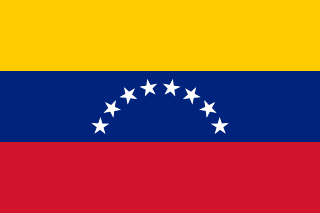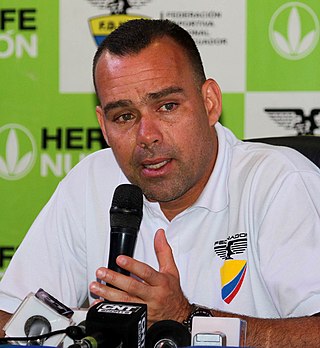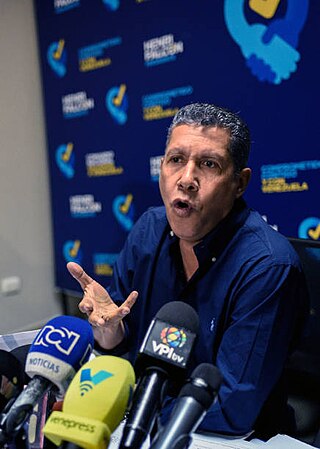
Venezuela, officially the Bolivarian Republic of Venezuela, is a country on the northern coast of South America, consisting of a continental landmass and many islands and islets in the Caribbean Sea. It comprises an area of 916,445 km2 (353,841 sq mi), and its population was estimated at 29 million in 2022. The capital and largest urban agglomeration is the city of Caracas. The continental territory is bordered on the north by the Caribbean Sea and the Atlantic Ocean, on the west by Colombia, Brazil on the south, Trinidad and Tobago to the north-east and on the east by Guyana. Venezuela is a presidential republic consisting of 23 states, the Capital District and federal dependencies covering Venezuela's offshore islands. Venezuela is among the most urbanized countries in Latin America; the vast majority of Venezuelans live in the cities of the north and in the capital.

Psidium is a genus of trees and shrubs in the family Myrtaceae. It is native to warmer parts of the Western Hemisphere. Many of the species bear edible fruits, and for this reason several are cultivated commercially. The most popularly cultivated species is the common guava, Psidium guajava.

The Union of South American Nations (USAN), sometimes also referred to as the South American Union, abbreviated in Spanish as UNASUR and in Portuguese as UNASUL, is an intergovernmental regional organization. It once comprised twelve South American countries; as of 2019, most have withdrawn. It was set up by Hugo Chavez to counteract the influence of the United States in the region.

The Revolution Will Not Be Televised, also known as Chávez: Inside the Coup, is a 2003 Irish documentary film. It focuses on events in Venezuela leading up to and during the April 2002 coup d'état attempt, which saw President Hugo Chávez removed from office for two days. With particular emphasis on the role played by Venezuela's private media, the film examines several key incidents: the protest march and subsequent violence that provided the impetus for Chávez's ousting; the opposition's formation of an interim government headed by business leader Pedro Carmona; and the Carmona administration's collapse, which paved the way for Chávez's return. The Revolution Will Not Be Televised was directed by Irish filmmakers Kim Bartley and Donnacha Ó Briain. Given direct access to Chávez, the filmmakers intended to make a fly-on-the-wall biography of the president. They spent seven months filming in Venezuela, following Chávez and his staff and interviewing ordinary citizens. As the coup unfolded on 11 April, Bartley and Ó Briain filmed on the streets of the capital, Caracas, capturing footage of protesters and the erupting violence. Later, they filmed many of the political upheavals inside Miraflores, the presidential palace.

Corporación Venezolana de Televisión or VTV is a state-run television station based in Caracas, Venezuela, which can be seen throughout the capital and surrounding areas on channel 8. Programs that can be seen on VTV included Aló Presidente and Telesur Noticias.

Rafael Édgar Dudamel Ochoa, is a Venezuelan football manager and former player who played as a goalkeeper. He is the current manager of Colombian club Atlético Bucaramanga.

Agropyron cristatum, the crested wheat grass, crested wheatgrass, fairway crested wheat grass, is a species in the family Poaceae. This plant is often used as forage and erosion control. It is well known as a widespread introduced species on the prairies of the United States and Canada.

The history of the Jews in Venezuela dates to the middle of the 17th century, when records suggest that groups of marranos lived in Tucacas, Caracas and Maracaibo. The Jewish community, however, did not become established in Venezuela until the middle of the 19th century. Since Hugo Chávez took power in 1999, tension has existed between the government and Jewish population, which has seen large numbers emigrating. Today, the majority of Venezuelan Jews live in Israel, while modern-day Venezuela continues to host a modest Jewish population.

Oenocarpus is a genus of pinnate-leaved palms (Arecaceae) native to Trinidad, southern Central and tropical South America. With nine species and one natural hybrid, the genus is distributed from Costa Rica and Trinidad in the north to Brazil and Bolivia in the south.

José Manuel Rey Cortegoso is a Venezuelan former footballer who played as a central defender, currently a manager.

Cyrtopodium, often abbreviated Cyrt in horticulture, is a genus of more than 40 species of epiphytic and terrestrial orchids found from Florida and Mexico through Argentina. Cyrtopodium is the only genus in the monotypic subtribe Cyrtopodiinae.

Mesotherium is an extinct genus of mesotheriid, a long-lasting family of superficially rodent-like, burrowing notoungulates from South America. It one of the youngest notoungulates, and the last known member of Typotheria. It was first named by Étienne Serres in 1867, and only contains a single species, Mesotherium cristatum, spanning the Early-Middle Pleistocene.

Serbia–Venezuela relations are foreign relations between Serbia and Venezuela. Venezuela is represented in Serbia through its embassy in Belgrade. Serbia is represented in Venezuela through its embassy in Caracas that was re-opened in 2023.
The Hodï language, also known as Yuwana (Yoana), Waruwaru, or Chikano (Chicano), is a small unclassified language spoken by the Hodï people of Venezuela. Very little is known of it; its several hundred speakers are monolingual hunter-gatherers. The people call themselves Jojodö or Wįlǫ̈, and their language Jojodö tjįwęnę. The two communities with the most speakers are San José de Kayamá and Caño Iguana, with several hundred speakers total.

Cyrtopodium andersonii is a species of orchid. It is native to South America. It is the type species of the genus Cyrtopodium.

Cyrtopodium parviflorum is a species of orchid. It is native to Trinidad and to South America.

Henri Falcón Fuentes is a Venezuelan politician, lawyer, and retired Bolivarian Army non-commissioned officer. He served as mayor for two consecutive terms of Barquisimeto, Iribarren Municipality from 2000 to 2008 and as Governor of Lara from 2008 until 2017. He was a candidate in the 2018 Venezuelan presidential election.

In Venezuela, Moreno(Spanish: Dark, Swarthy, Brown) is a broad term to describe those Venezuelans, who tend to be multiracial, typically those who are genetically intermediate between Africans, Amerindians and/or Europeans. Historically known as mulattos, mestizos, pardos, and zambos. Some Moreno Venezuelans may also be mixed with Asian ancestry, although this is not as common.

Melampyrum cristatum, also known as crested cow-wheat is a species of flowering plant in the family Orobanchaceae.

The Coro Revolution, also known as the Colinada Revolution, was an armed insurrection led by General León Colina that occurred in Venezuela between October 1874 and February 1875 against the government of Antonio Guzmán Blanco. The conflict was one of the main armed movements against the dictatorship of Antonio Guzmán Blanco.



















